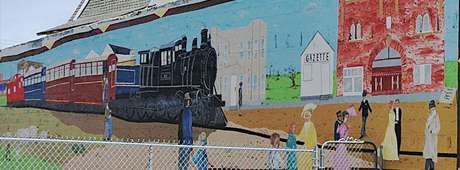No products in the cart.
Glenns Ferry—Spotlight City

A Theatrical Town
By Dorothy Drake
When my husband Jim and I made an exploratory trip to Glenns Ferry in late 2018, our impression was of a time-worn town, run down in some places—yet as we drove around, we were struck by the contrast of unkempt and well-maintained properties in the same block. It became apparent that there was more than first meets the eye in Glenns Ferry. We were approaching retirement age and had come here in search of a quiet, small place in which to live. I was born in Pocatello, raised in Salt Lake City, and spent every summer from age eight to eighteen in the Pocatello area with my aunt. School, marriage, and careers had moved me to many cities throughout the West before we finally settled in Reno. Years passed, and now it was time to return to Idaho.
As we drove down the main street, we noticed the usual town services such as a gas station, grocery, motel, and an antique shop. We saw a modern school and also discovered that the original school, built in 1909, had
been converted to a museum that housed an impressive collection of the town’s railroad history. Continuing on an adjacent street, we found a hardware store, a restaurant, bar, and a theater. A theater? In a town of thirteen hundred? This invited more research. We followed signs to the state park, and on the way passed a fudge-maker and a thrift store. The drive, which opened onto gorgeous views along the Snake River, took us to a castle-like winery and a golf course, and then to the beautiful Three Island Crossing State Park and Interpretive Center.
Our visit revealed a small town with friendly people, an agricultural lifestyle, fishing, hunting, and an active fairground. Yup, this sounded just right.
I followed up on my idea to do more research of the town’s theater, which led to a big change for us: about a year after that
initial visit, Jim and I purchased the Glenns Ferry Historic Opera Theater. When I recently saw a sign in front of a rundown building that read, “This theater is important,” the words resonated. I know our theater is important in this part of western Idaho: historically, aesthetically, socially, and sentimentally to the volunteer casts and their audiences. We bought the theater for those reasons, but also because it has a persona of its own, pieces of the past that can be seen and felt. It didn’t seem to matter that I had no theater experience or that I was supposed to be retired. I launched into this new career based on the lure of the building alone, intrigued by its impact on the multitude of generations that have walked through its doors. Later, as I looked into the history of Glenns Ferry, I uncovered significant parallels through the decades between the life of the town and of the theater.
As a lover of the Edwardian and Craftsman architecture from 1900 to WWI, my first impression of the theater was of classic bones, fantastic woodwork, and an opportunity to scrape away the years to peek at the building’s original grandeur. Jim and I had no real idea of what we were getting into when we bought it, and I laughed when more than one prior owner expressed the same sentiment. Somehow, I felt that my love of historic architecture and our combined experience as event planners could translate to operating a theater. I knew its infrastructure needed to be addressed when I saw that the electrical panel cover had been signed in large letters by the original electrician. I was told that early electricians signed their work because wiring buildings was dangerous, and this was a way to preserve their legacy. I saved that door. We added modern heat and air conditioning, the walls were scraped down and repainted, period sconces were found and installed, and the curtain arch decoration was restored to its original design. We discovered fabulous murals when the ceiling was replaced, but water damage had taken its toll and the entire ceiling came down in huge chunks, destroying the artwork.
This content is available for purchase. Please select from available options.
Purchase Only
Purchase Only


Comments are closed.